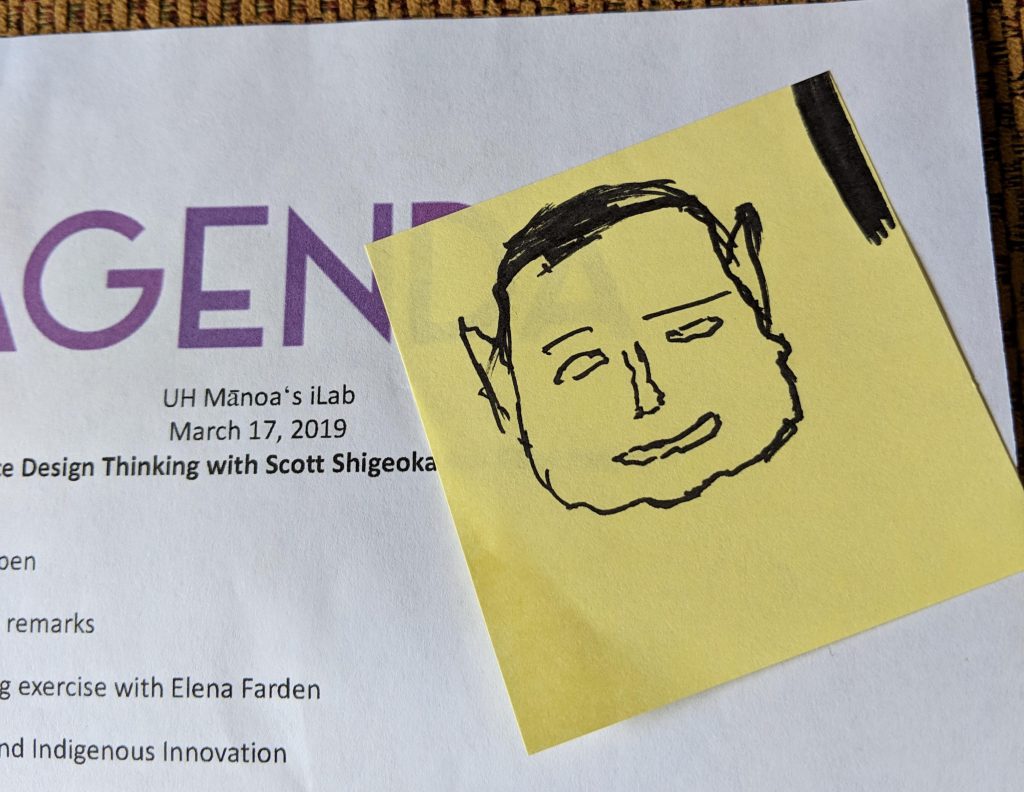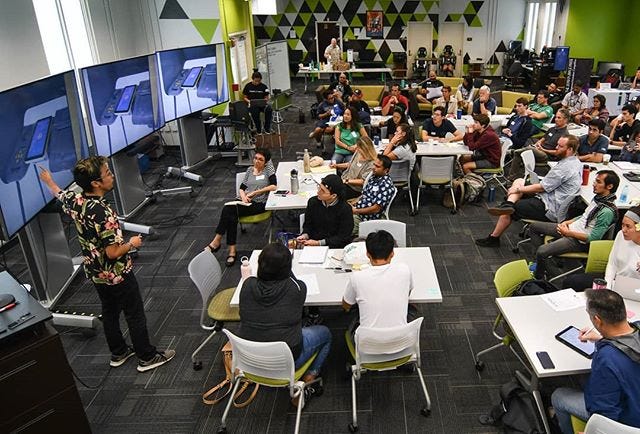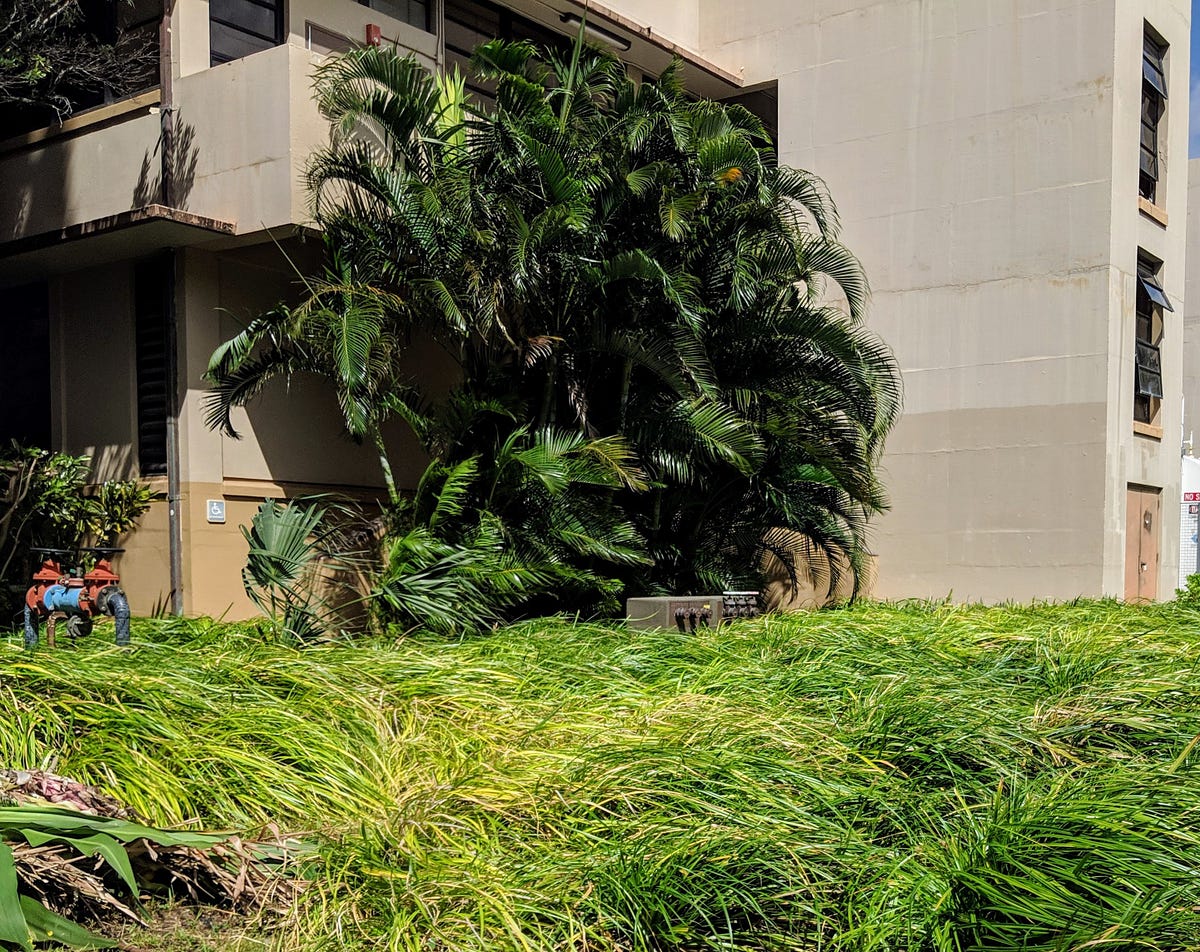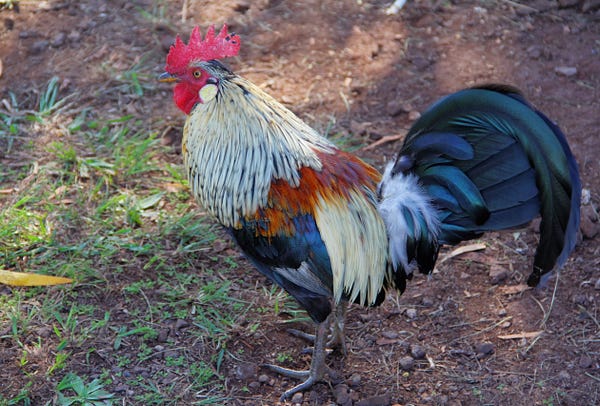Not your usual startup event

I’ve recently gotten involved in the Indigenous Innovation community here in Hawaii. What does Indigenous Innovation mean, you ask? Fair question: it’s an evolving discussion in the community, but it’s centered on sustainable innovation in the context of the local community. Dr. Kiana Frank, a Molecular Biologist with a penchant for teaching science through dance, said something that has really stuck with me.
Innovation is the art of taking something ancient and making it modern.
I was fortunate to be invited to a product design workshop last weekend, organized by Purple Mai’a and creatively led by a rather unique fellow, Scott Shigeoka. I’ve been to a lot of startup events in my life. Hundreds, probably.
This wasn’t like any other startup event I’ve ever been to.
To begin, Elena Farden gathers all 50 or so of us in one large circle, holding hands and chanting in Hawaiian. 60 year old entrepreneurs holding hands with 12-year old student innovators holding hands with University students holding hands with high school teachers. The contrast between the feeling this creates — “we’re all in this together” — compared to the riotous chaos of individual goals and agendas of Boston or Silicon Valley meeting, is striking. Neither is necessarily wrong, just striking in their difference. An opportunity to borrow and learn.
Purple Mai’a is a great non-profit I’ve gotten involved with. They have two main activities. They teach computer science skills to Native Hawaiian and low-income students, and they run the Purple Prize, an innovation competition that provides cash rewards to projects that are forces for sustainable innovations rooted in Hawaii. Today’s workshop is a Product Design session providing assistance to groups competing for this year’s Purple Prize. I’m ostensibly here to mentor, but in fact I will end up taking away a number of key insights for my own work on Bookship, my social reading app.

Our first exercise is to get us comfortable with the person sitting next to us. That means pairing up, sitting knee-to-knee and drawing a picture of each other, in 30 seconds, on a yellow post-it. Next to me is George, a University of Hawaii student and innovator, and he draws the picture you saw above (apparently I am Vulcan 😉). This is a consistent theme through these meetings, the emphasis on people and creating real connections.
You might be familiar with the phrase, “It’s not an event, it’s a process.” This event feels that way — not a discrete event — but part of a process (which it is). But most meetings could be improved by summoning some of that feeling.
Each group is roughly organized into interest groups and given a topic to brainstorm (mine is education and the future of work). Scott gives us our second task — “take a walk outside, observe nature and the campus (we’re on the University of Hawaii campus), and see what inspiration you can draw. Be back in 15 minutes”.

My group is three older men, and three college students; the age difference provides some interesting differences of perspective. One of the students remarks on the balance between freedom and control and the need to create systems that accommodate both. For myself, the interplay between the organic shapes of nature and the rectilinear geometry of the concrete buildings is an interesting contrast. We’re talking about what a beautiful day it is and how peaceful it feels. I say, “your environment determines your frame of mind”. George, one of the students, replies, “Winston Churchill said ‘We shape our buildings and afterwards our buildings shape us’”. I’m left feeling more than a little impressed to have Churchill quoted to me off-the-cuff.
On our return, Scott asks for people to share what they brought back from their walk. A young man of 12 gets up to talk about feeling gratitude for being here and being grounded in the land and his Na’au — the Hawaiian concept that means both your gut (literally), as well as the mind and the seat of your thought and moral nature (in Hawaiian culture the two are the same). One doesn’t normally expect gravitas from a 13 year old, but he has it.
I’m really enjoying the multi-generational feel of the event (other than being out-quoted by college students :)). There’s a team of young men (13? 14?) from Maui, including the young man who just spoke, who are building an inexpensive bat detector using sensors that can send data to an easy to use app-based dashboard (Are you kidding me???? at 13????). Their objective to is find ways to help the endangered ʻOpeʻapeʻa bat, Hawaiian’s only native terrestrial mammal. George and a few of his friends have a startup project going for showcasing student work. It’s a really cool site, nicely executed, and we’ve chatted about customer acquisition strategies, SEO and the like, and potential partnerships they might form. I’m glad to be able to provide whatever guidance I can, but in all honesty I feel I’m getting as much as giving.
The event is multi-disciplinary as well. I have a long conversation on a break with Martha, a video artist from the Philippines, and a very instructive chat with educator Miki Tomita of Education Incubator, who is re-imagining corporate internships. We discuss my social reading app Bookship. She’s got a number of interesting insights into potential Bookship features, like a audio/video read aloud mode, and a private chat channel so students not comfortable asking questions in a group can approach an instructor 1:1. I meet someone who’s using machine learning to tackle fish speciation and management. Venture capitalists. It’s a merry band.
Another thing that’s different about this meeting — and others I’ve been to in Hawaii — is the periodic “get up and move” breaks. Instead of a 20 minute coffee break, we have an impromptu Bruno Mars dance-off, and later a Jan Ken Po tournament (rock-paper-scissors). You play against your neighbor. You win, you move on. You lose, you follow the person who beat you and cheer them on. Each round, all the losers come along and cheer their winner. Soon there’s a conga line of losers winding around the room, chanting for their team, and culminating in the entire room chanting the name of one of the two finalists until we have a champion. The whole thing takes just a few minutes, and there’s a ton of energy and laughter.
My group is tackling a meaty topic — “How might we improve education to tackle the Future of Work”. Scott has been with IDEO and we’re following the IDEO Design Thinking framework to brainstorm, which emphasizes creating a lot of ideas without judging them, at first. We end up with a lot of interesting ideas and again I find the contrast between the approaches of the younger and older generations striking and energizing. I find that Hawaiian culture has a much stronger embrace of inter-generational relationships and I think it is rewarding for everyone. And everyone hugs a lot, even strangers, which takes some getting used to for me. :). Of course we really aren’t taking action on our brainstorming topic, we’re just using to train ourselves, but a number of the proposals trigger related thoughts for me about my current work.

There’s a rooster crowing outside the room we’re in.
(Seriously. Chickens are everywhere here.) Perhaps he’s signaling the event is over….
Elena Farden gathers us in a circle again. We go around the circle, everyone asked to give one word or sentence of someone or something they are grateful for from the meeting. It’s surprising how many people name names — people they’ve met for the first time today — and express gratitude. For an old city-dweller white guy from Boston it feels strangely and positively intimate. An actual community — “we’re all in this together” — not just a group of people with a temporarily shared interest, or in competition.
I leave with a renewed enthusiasm, a feeling I’m a part of something, with a mentor’s lei around my neck and bunch of things I need to do for my work on Bookship. Exit surveys for people who just finished readings. Teachers to track down and interview. A way to record audio/video, or video chat, into the app. And five or ten other things I’ve been putting off.
Perfect.
